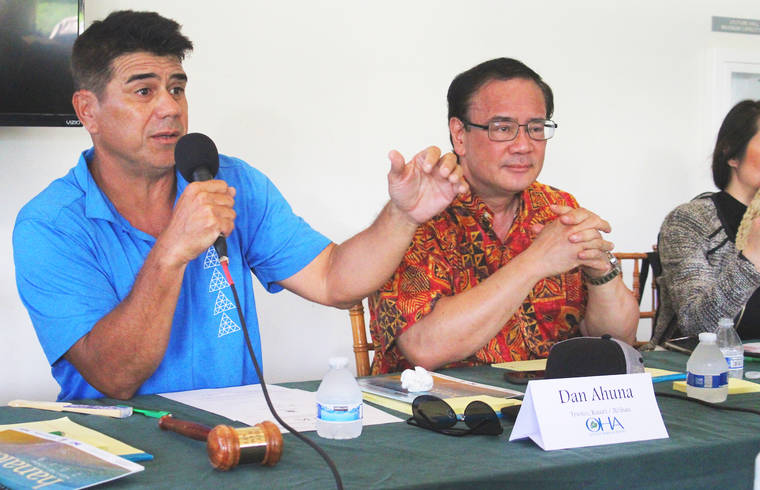WAIPA —The North Shore community showed up in force at the Waipa Foundation Center Wednesday evening to take part in an Office of Hawaiian Affairs public meeting.
Around 30 people listened to public testimony for about an hour and a half as the OHA trustees contemplated the input.
People talked to the trustees about issues they have faced over the past year and a half relating to historic flooding, the restoration efforts that came after, and then the eventual reopening of Kuhio Highway.
Prior to the meeting, OHA trustees from every island toured nearby taro patches to get an idea of some of the recovery efforts people are undertaking.
“I believe that the people of Kauai are resilient,” said Kamealoha Hanohano-Smith.
“And I believe that with or without the help of OHA, with or without the cooperation of OHA, with or without understanding with people that work with OHA, that it doesn’t just happen. We’re gonna get it done. We’re going to make sure that we make opportunities, both economic and education, available for the kids in our community.”
Hanohano-Smith said his experience with OHA in the past has not always been a positive one.
“One of the problems is the grant system,” Hanohano-Smith said. “Currently, I don’t believe that you folks have an objective grant system that can properly vent our ideas so that people in my community can receive a fair share of our trust funds.
“Everything at OHA, or seems to be, is done according to who you know and who you ask. Who to ask and how do you know to ask. That came out in one of the audits.”
Hanohano-Smith said he believes that the power to administer grants should be taken out of OHA trustees’ authority.
“Outsourcing the grants might lessen some of the political influence that currently exists,” he said, adding that community meetings hosted by OHA should have a little more meat if they are going to cost taxpayers money.
Others expressed gratitude to OHA.
“Your support of that has been critical,” Maka‘ala Ka‘aumoana said of OHA’s support of North Shore taro farms. “It’s been well received and encouraged. Please don’t disengage until that is pau. They’re working hard, and they couldn’t have done what they did without you.”
Ka‘aumona said discussions are needed within OHA for better future planning and to learn from what happened to the North Shore.
“It seems to me that a high-level policy discussion is needed to support total recovery from the events such as major flood or hurricane,” she said. “The recovery work turns residents to structures in harm’s way. This is a very difficult issue, but must be faced, as we all watch the oceans warm and rise. Our kupuna and medically fragile people are most at risk.”
Ka‘aumona called on OHA to convene discussions and launch a serious effort to develop policy to protect individuals from such threats.
“What I’m here to say is that the community is already getting more involved in protecting our resources from change, everything you see right now from the ocean to the mountains,” Moku Puuki-Chandler said. “Right now there are little hiccups here and there from other entities, but if we come across as very respectful to each other and hold our composure, it can always work out for the benefit of this place. And our economy is that we’ll be back.”
Puuki-Chandler added, “great things are happening in the community.”
•••
Ryan Collins, county reporter, can be reached at 245-0424 or rcollins@thegardenisland.com.




OHA has one beneficiary following the decision of SCOTUS on February 23, 2000 in Rice v. Cayetano, that beneficiary is the ‘native Hawaiian’ as described in the Hawaiian Homes Commission Act of 1921 item “(7) The term ‘native Hawaiian’ means any descendant of not less than one-half part of the blood of the races inhabiting the Hawaiian Islands previous to 1778”. ‘Hawaiian’ as identified in the State Constitution was found unconstitutional because it was racial for voting and seeking office in OHA’s election. And, where is the By-laws presented and approved by the OHA Board for all American citizens to read and understand?